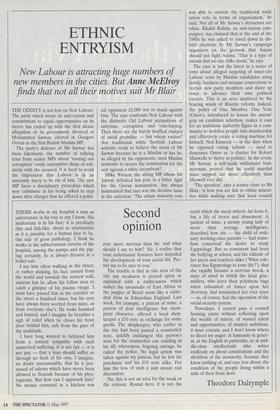Second opinion
THERE works in my hospital a man as unfortunate in his way as any I know. His misfortune is in his face: it is peculiarly thin and fish-like, about as unattractive as it is possible for a human face to be, this side of gross pathology. I think he works in the subterranean caverns of the hospital, among the pumps and the pip- ing: certainly, he is always dressed in a boiler suit.
I see him often walking in the street, or rather slinking, his face turned from the world and towards the nearest wall, anxious lest he allow his fellow men to catch a glimpse of his piscine visage. I must have passed him in the corridor or the street a hundred times, but his eyes have always been averted from mine, as from everyone else's. He looks haunted and hunted, and I imagine he breathes a sigh of relief when he closes his front door behind him, safe from the gaze of the multitude.
I have long wanted to befriend him from a natural sympathy with such unmerited suffering. It is not fair — it is not just — that a man should suffer so through no fault of his own. I imagine, no doubt unreasonably, that he is pos- sessed of talents which have never been allowed to flourish because of his phys- iognomy. But how can I approach him? No mouse cornered in a kitchen was ever more nervous than he: and what should I say to him? 'Sir, I realise that your unfortunate features have impeded the development of your social life. Per- mit me to be nice to you.'
The trouble is that in this area of the city any weakness is preyed upon or exploited with a ruthlessness which makes the savannahs of East Africa or the jungles of Brazil seem like a cathe- dral close in Edwardian England. Last week, for example, a patient of mine, a person of slow intelligence but exem- plary character, offered a local shop- keeper a £10 note in exchange for some goods. The shopkeeper, who earlier in the day had been passed a counterfeit note, quickly exchanged this person's note for the counterfeit one residing in his till; whereupon, feigning outrage, he called the police. No legal action was taken against my patient, but he lost his purchases and his £10 note alike. For him the loss of such a sum meant real discomfort.
No, this is not an area for the weak or the reticent. Round here, it is not the earth which the meek inherit, far from it, but a life of terror and abasement. A patient of mine, a mousy young lady of more than average intelligence, described how she — the child of ordi- nary working-class parents — had some- how conceived the desire to study Egyptology. But so consistent had been the bullying at school, and the ridicule of her peers and teachers alike ('What rele- vance has Egyptology to your life?'), that she rapidly became a nervous wreck, a state of mind in which the local glue- sniffers, who leave their polythene bags when exhausted of fumes upon her doorstep, had maintained her ever since — as, of course, had the operation of the social security system.
Nowadays, I cannot pass a council housing estate without reflecting upon the wealth of misery, of wasted talent and opportunities, of stunted ambitions, it must contain, and I don't know where to direct my anger: at humanity in gener- al, at the English in particular, or at mid- dle-class intellectuals who witter endlessly on about constitutions and the abolition of the monarchy, because they know nothing of, and care less about, the condition of the people living within a mile of their front door.
Theodore Dalrymple


































































 Previous page
Previous page